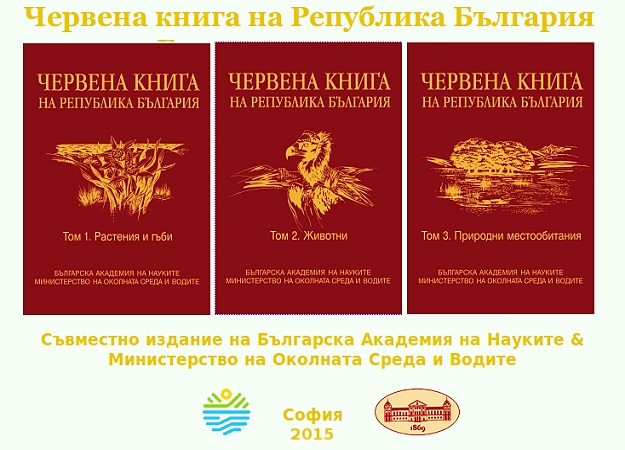Institute of Biodiversity and Ecosystem Research
 The Institute of Biodiversity and Ecosystem Research (IBER) conducts research on the theoretical and applied aspects of ecology, biodiversity, environmental protection and sustainable use of biological resources. IBER was established on July 1, 2010 as a successor to three units of BAS: Institute of Botany, Institute of Zoology and Central Laboratory of General Ecology.
The Institute of Biodiversity and Ecosystem Research (IBER) conducts research on the theoretical and applied aspects of ecology, biodiversity, environmental protection and sustainable use of biological resources. IBER was established on July 1, 2010 as a successor to three units of BAS: Institute of Botany, Institute of Zoology and Central Laboratory of General Ecology.
The Institute is a major scientific center in Bulgaria in the fields of botany, mycology, zoology, ecology, hydrobiology, parasitology, conservation biology, genetics of the environment, evolutionary biology and other related scientific fields. It provides scientific information, provides methodological assistance to state institutions and civil society structures and presents the country in the European Research Area in the areas of its competence.
Scientific activity
Priority directions in the scientific activities of IBER are:
- Studying the structure and functioning of the evolution of organism world, biotic communities, ecosystems and landscapes;
- Conservation of living nature, approaches and methods for sustainable management of protected natural sites and biological resources;
- Studying the ecology and biology of economically and socially significant species;
- Assessment of environmental risk, environmental quality and impacts on it;
- Developing approaches and methods for biodiversity assessment, bio-monitoring and biosafety systems.
The most important scientific achievements and results of the Institute’s work:
- Inventory, classification and conservation of biological diversity, and over the last 5 years the scientists from IBER have described more than 90 new species of science (mushrooms, higher plants, invertebrates and vertebrates);
- Studying rare and endangered species and their habitats; distribution and conservation of medicinal plants and use of their biologically active substances;
- Assessment of the main factors for loss of biodiversity in the context of global change: habitat fragmentation, environmental pollution, invasive species;
- Monitoring and assessment of environmental changes: development of methodologies for assessment, classification and improvement of ecosystem status, use of indicator species, development and implementation of bio-analysis and environmental assessment indices;
- assessments of the conservation status of species and natural habitats: development of expert opinions and opinions, management plans for protected areas, nature reserves and national parks; extension of the NATURA 2000 protected area system;
- Mapping and assessment of the state of ecosystems (land, freshwater and marine) and ecosystem services.
Over the last 5 years, IBER has been implementing projects under programmes of the European Commission (23), the European Economic Area (7), the US National Science Foundation, USA (1), other foreign science funds (22), the MOEW (17), other state institutions (6) and companies (14).
IBER maintains the largest and most representative herbarium on the flora of Bulgaria and the Balkan Peninsula, the only one of its kind in Bulgaria mycological (SOMF) and paleobotanical collections and one of the richest zoological collections in Bulgaria.
The Institute disposes of 7 field stations to conduct scientific research in natural conditions (Sreburna, Kalimok, Atanasovsko Lake, Beglika, Plana, Parangalitsa and Sozopol) and renovated laboratories (molecular, chemical, light-microscopy laboratory, chromatographic analysis, ultrastructure and histology, cytogenetic, GIS-center).
Educational activity
The institute is accredited for postgraduate training under the following programs:
- ecology and ecosystem protection;
- botany;
- zoology;
- mycology;
- hydrobiology;
- parasitology and helminthology;
- genetics.
The Institute runs schools, led by Assoc. Prof. Dr. Boris Nikolov, for pupils and young nature-lovers at the Bulgarian Ornithological Center. The course “Introduction to basic methods for ecological research in ornithology” is being held at Biological Experimental Base “Kalimok”.
Contacts
Червена книга на Република България
“Red Data Book of the Republic of Bulgaria” (2015) – second updated and completed edition in three volumes. The publication is available online at http://e-ecodb.bas.bg/rdb/bg/.
The development is realized on the basis of 10 years of work of over 200 scientists and specialists from IBER, NMNHS, Sofia University “St. Kliment Ohridski”, “Paisii Hilendarski” University of Plovdiv, as well as by a number of NGOs and companies in the country.
In three volumes are presented 808 species of plants and mushrooms, 287 animals and 166 natural habitats.


